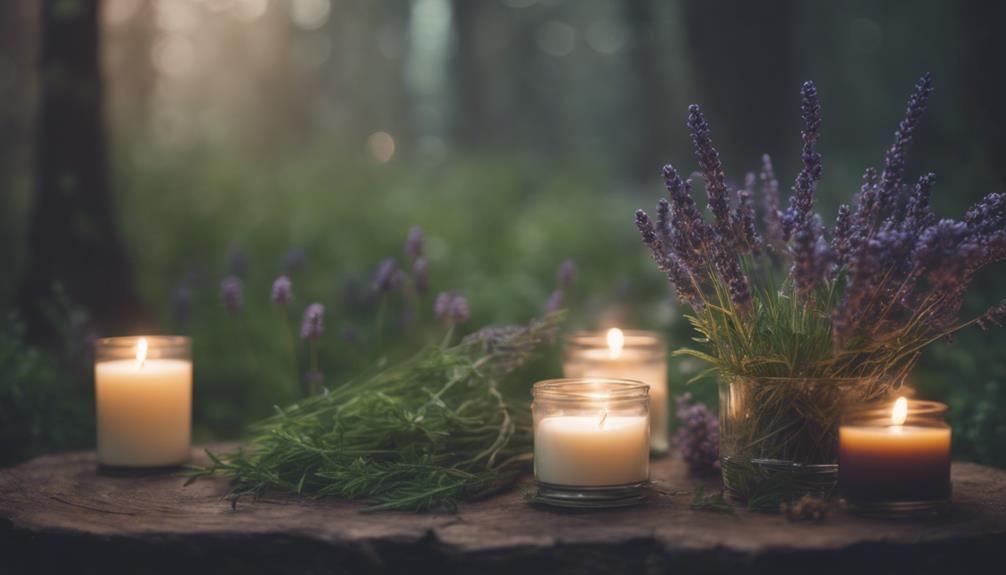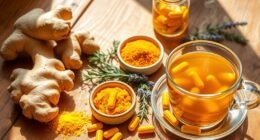We're taking the first steps towards mastering herbalism by building a strong foundation, familiarizing ourselves with plant identification, properties, and uses. Next, we'll explore individual herbs, understanding their properties, actions, benefits, and drawbacks. We'll then learn about herbal formulations, preparation methods, and contraindications. To practice safely, we'll start with small dosages, consult with experts, and keep detailed records. As we refine our skills, we'll experiment with herbal blends, seek mentorship, and stay updated on new research findings. Finally, we'll commit to ongoing learning, seeking guidance from experienced herbalists and staying informed about the latest trends.
Key Takeaways
• Familiarize yourself with plant identification, properties, and uses to build a strong foundation in herbalism.
• Investigate individual herbs to gain detailed knowledge of their characteristics, benefits, and drawbacks.
• Learn about various herbal formulations, their preparation methods, and potential contraindications and side effects.
• Prioritize safety in herbal practice by researching interactions, starting with small dosages, and consulting with experts.
• Continuously update your knowledge by subscribing to reputable sources, attending workshops, and seeking guidance from experienced herbalists.
Building a Strong Foundation
To build our herbalism foundation effectively, we must familiarize ourselves with the basics, including plant identification, properties, and uses, which will provide a solid understanding of medicinal plants and their applications.
As we begin learning about herbalism, establishing a strong foundation is imperative. We can do this by delving into herbal literature and resources, such as herbalism books, to expand our knowledge on medicinal plants and their applications. By doing so, we'll gain a deeper understanding of the properties and uses of various herbs, allowing us to make informed decisions about our health.
A strong foundation will also enable us to explore different herbal traditions and systems, like Traditional Chinese Medicine or Ayurveda, and appreciate their unique perspectives. By laying a solid groundwork, we'll be better equipped to absorb and apply the knowledge we acquire, ultimately becoming proficient in the art of herbalism.
Exploring Herbs Individually

We'll explore further into the world of herbalism by examining one herb at a time, starting with a thorough investigation of a single herb each week. This allows us to delve deeper into the properties and actions of each herb, gaining a more detailed understanding of its benefits and potential drawbacks.
| Herb | Characteristics |
|---|---|
| Peppermint | Latin name: Mentha piperita, Common name: Peppermint, Properties: Cooling, calming |
| Chamomile | Latin name: Matricaria chamomilla, Common name: German Chamomile, Properties: Soothing, calming |
| Ginger | Latin name: Zingiber officinale, Common name: Ginger, Properties: Warming, stimulating |
| Echinacea | Latin name: Echinacea spp., Common name: Purple Coneflower, Properties: Immune-boosting, anti-inflammatory |
| Lavender | Latin name: Lavandula angustifolia, Common name: English Lavender, Properties: Calming, relaxing |
Understanding Herbal Formulations

As we explore the world of herbal formulations, we're faced with a multitude of options, from tinctures and syrups to salves, capsules, and teas, each with its own unique benefits and preparation methods.
To truly understand how to use herbs effectively, we need to delve deeper into these formulations. We're learning that each method has its own strengths and weaknesses, and it's crucial to research and understand the preparation methods for each.
By using resources like YouTube tutorials and herbalism books, we can learn the step-by-step processes for creating different formulations. As we experiment with different methods, we're prioritizing safety by researching contraindications and potential side effects.
We're taking it a step further by testing these formulations on ourselves, observing their effects and efficacy before sharing them with others. By practicing and refining our skills, we're developing the expertise to create effective and safe herbal remedies for personal and family use.
Through this process, we're not only learning about herbal formulations but also gaining hands-on experience using herbs to improve our well-being.
Practicing Herbalism Safely

We take the next step in our herbalism journey by prioritizing safety above all else, recognizing that responsible herbal practice is just as important as understanding formulations. As we dive deeper into the world of herbalism, we must remember that safety should always be our top priority. Using herbs without proper knowledge can be detrimental to our health, which is why we need to take a cautious approach.
Here are some essential safety guidelines to keep in mind:
- Research contraindications and potential interactions: Don't assume that herbs are always safe to use together or with medications.
- Start with small dosages: Begin with a low dose to gauge your individual reaction and avoid adverse effects.
- Consult with a qualified herbalist or healthcare provider: Get personalized guidance on herbal safety, especially if you have a pre-existing condition.
- Keep a detailed record of herb usage: Track dosages, effects, and any adverse reactions to refine your herbal practice over time.
Refining Your Herbal Skills

Now that we've established a safe foundation for our herbal practice, it's time to refine our skills through continuous experimentation, education, and mentorship.
We should spend time creating and testing herbal blends, experimenting with different recipes and techniques to develop our formulation skills. Make sure to stay updated on new herbal information and techniques to enhance our knowledge and skills.
Seeking guidance from experienced herbalists or mentors can help us learn advanced skills and gain valuable insights. As we refine our skills, we should focus on creating safe and effective herbal blends for ourselves and others, building confidence in our abilities.
Considering formal herbalism programs can provide in-depth knowledge, certification, and professional development in the field. By continually refining our skills and knowledge, we can become proficient herbalists, equipped to help ourselves and others achieve better health and wellness.
Exploring Professional Opportunities

As we explore professional opportunities in herbalism, we're enthusiastic to discover the various career paths and business ideas that align with our passion for botanicals.
From becoming a clinical herbalist to creating a line of herbal products, we're keen to uncover the many ways we can turn our knowledge into a fulfilling profession.
Herbal Career Paths
With numerous professional opportunities available, herbalism offers a diverse range of career paths for those passionate about natural health and wellness. As we explore the world of herbalism, we're excited to discover the various ways we can turn our passion into a fulfilling career.
Here are just a few examples of the many career paths available to us:
- Clinical Herbalist: Work one-on-one with clients to create personalized herbal remedies and wellness plans.
- Herbal Product Developer: Formulate and create herbal products, such as teas, tinctures, and salves, for companies or our own businesses.
- Herbal Educator: Share our knowledge with others by teaching classes, workshops, or online courses on herbalism.
- Herbal Consultant: Offer expert advice to businesses, schools, or individuals on incorporating herbalism into their practices.
One of the best things about herbalism is that there are so many ways to pursue a career in this field. Whether we're interested in learning about clinical herbalism, product development, education, or consulting, there's a path that's right for us.
With certification programs, apprenticeships, and networking opportunities available, we can take our passion for herbalism to the next level.
Herbal Business Ideas
Moreover, we've numerous opportunities to monetize our passion for herbalism, from creating product lines to offering consulting services.
One option is to start an herbal product line, such as herbal teas, salves, or tinctures, for sale to local markets or online. We can also consider offering herbal consultations or creating personalized herbal blends for clients seeking holistic health solutions.
Another avenue is to look into opening an herbal apothecary or wellness store where customers can purchase a variety of herbal products and remedies. Additionally, we can explore teaching herbalism workshops, online courses, or hosting herbal retreats to share our knowledge and expertise with others.
Additionally, we can consider partnering with spas, yoga studios, or health food stores to offer our herbal products or services to a wider audience. By pursuing these opportunities, we can turn our passion for herbalism into a successful business venture.
Committing to Ongoing Learning

As we continue on our herbalism journey, we recognize that staying current with the latest research and building a community of like-minded individuals are essential components of committing to ongoing learning.
We need to stay informed about the latest developments in the field, and connecting with others who share our passion for herbalism can provide valuable support and motivation.
Staying Current With Research
By committing to ongoing learning, we guarantee that our herbalism practice stays current, informed, and effective. To achieve this, we must stay up-to-date with the latest research findings and trends in the field. Here are some ways we can do this:
- Stay informed: Subscribe to reputable herbalism journals and newsletters to stay updated on the latest research findings and trends.
- Attend conferences and workshops: Attend herbalism conferences, workshops, and seminars to learn from experts and gain insights into current research in the field.
- Join online communities: Join online forums and discussion groups focused on herbalism to engage with peers and exchange knowledge about recent studies and developments.
- Follow experts: Follow reputable herbalists and researchers on social media platforms for regular updates on new studies, findings, and recommendations in herbalism.
Building a Community
In addition to connecting with like-minded individuals through local herbal study groups, online forums, and social media platforms, joining or creating a local herbal study group helps foster a sense of community and accelerates our growth as herbalists.
Attending workshops, conferences, or online webinars also provides opportunities to connect with experienced herbalists and expand our knowledge in the field. Seeking guidance from mentors who've walked the path before us offers valuable insights and direction for ongoing learning.
Participating in herb walks, plant identification classes, or herbal field trips deepens our understanding and appreciation for herbalism. Engaging with online herbal forums, social media groups, or virtual study circles allows us to exchange ideas and resources with like-minded individuals, promoting shared learning and growth within the community.
Frequently Asked Questions
How Do I Start Learning About Herbalism?
We're excited to start learning about herbalism, but where do we begin?
First, we need to build a solid foundation. We'll start by reading beginner-friendly books to grasp the basics.
Then, we'll explore further by researching new herbs daily or weekly, and documenting our findings in a spreadsheet, flashcards, or journal. This will help us understand the properties and uses of various herbs, and we can even try tasting a few to experience their effects firsthand.
How to Start Herbalism Journey?
As we commence our herbalism journey, did you know that only 10% of plant species have been studied for their medicinal properties? This statistic highlights the vastness of the herbalism world.
To start, we'll initiate by gathering foundational knowledge through books and research, documenting our progress along the way. By doing so, we'll establish a strong base to explore the world of herbalism, allowing us to make informed decisions and deepen our understanding of the natural world.
What Is Herb 101 Basics of Herbalism?
We're diving into the basics of herbalism, and it all starts with Herb 101. This fundamental course covers the essential principles of herbalism, including plant identification, herb properties, and medicinal uses.
We learn about different herbal actions, energetics, and how to use herbs for health and wellness. By grasping these basics, we set ourselves up for a deeper understanding of herbal medicine principles and practices.
Where Is the Best Place to Study Herbalism?
We believe the best place to study herbalism is at a reputable herbal school or through online courses, where we can gain a solid foundation in herbalism.
Additionally, local workshops, classes, and conferences offer hands-on experience and opportunities to learn from experts.
We can also consider herbal apprenticeships for practical training and join study groups or clubs for a supportive community to share knowledge and learn from others.
Conclusion
As we conclude our journey into the world of herbalism, we've gained a solid foundation for exploring the vast potential of plant-based remedies.
Did you know that, according to the World Health Organization, approximately 80% of the global population relies on traditional medicine, much of which is rooted in herbalism?
By committing to ongoing learning, we can tap into the full potential of herbalism and join the ranks of those who've harnessed its power for centuries.










